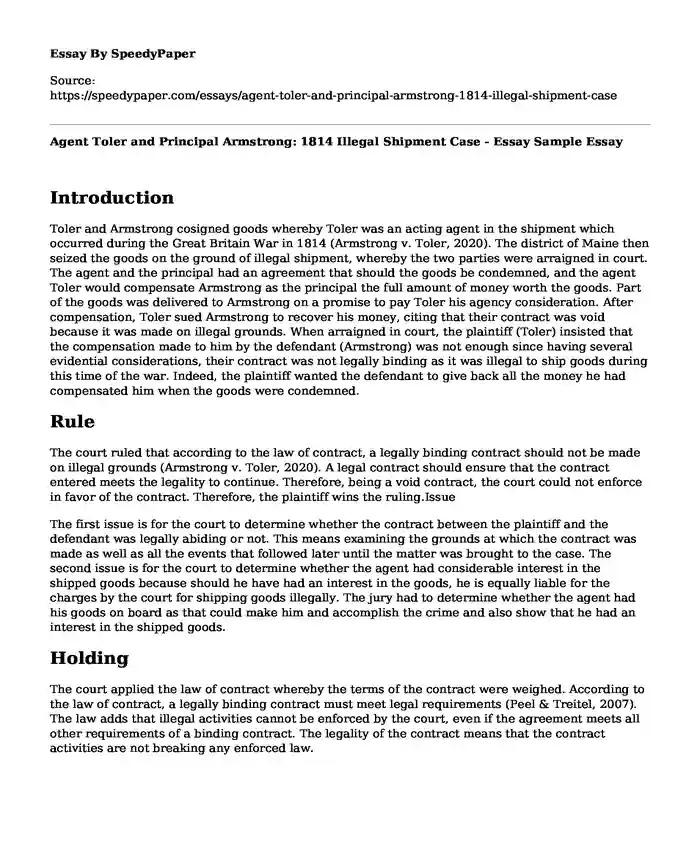
| Type of paper: | Essay |
| Categories: | Law Court system |
| Pages: | 3 |
| Wordcount: | 777 words |
Introduction
Toler and Armstrong cosigned goods whereby Toler was an acting agent in the shipment which occurred during the Great Britain War in 1814 (Armstrong v. Toler, 2020). The district of Maine then seized the goods on the ground of illegal shipment, whereby the two parties were arraigned in court. The agent and the principal had an agreement that should the goods be condemned, and the agent Toler would compensate Armstrong as the principal the full amount of money worth the goods. Part of the goods was delivered to Armstrong on a promise to pay Toler his agency consideration. After compensation, Toler sued Armstrong to recover his money, citing that their contract was void because it was made on illegal grounds. When arraigned in court, the plaintiff (Toler) insisted that the compensation made to him by the defendant (Armstrong) was not enough since having several evidential considerations, their contract was not legally binding as it was illegal to ship goods during this time of the war. Indeed, the plaintiff wanted the defendant to give back all the money he had compensated him when the goods were condemned.
Rule
The court ruled that according to the law of contract, a legally binding contract should not be made on illegal grounds (Armstrong v. Toler, 2020). A legal contract should ensure that the contract entered meets the legality to continue. Therefore, being a void contract, the court could not enforce in favor of the contract. Therefore, the plaintiff wins the ruling.Issue
The first issue is for the court to determine whether the contract between the plaintiff and the defendant was legally abiding or not. This means examining the grounds at which the contract was made as well as all the events that followed later until the matter was brought to the case. The second issue is for the court to determine whether the agent had considerable interest in the shipped goods because should he have had an interest in the goods, he is equally liable for the charges by the court for shipping goods illegally. The jury had to determine whether the agent had his goods on board as that could make him and accomplish the crime and also show that he had an interest in the shipped goods.
Holding
The court applied the law of contract whereby the terms of the contract were weighed. According to the law of contract, a legally binding contract must meet legal requirements (Peel & Treitel, 2007). The law adds that illegal activities cannot be enforced by the court, even if the agreement meets all other requirements of a binding contract. The legality of the contract means that the contract activities are not breaking any enforced law.
Disposition
The court determined that Armstrong had to give back the money he had been compensated with by Toler. This is because the court could not enforce their contract as it was illegally binding. The transaction between the agent and the principal was an illegal one because it was not allowed to ship goods then. The court also decided that Toler was not to be charged with having an interest in the illegally shipped goods. Armstrong compensated his agent or rather reserved the compensation as there was no valid contract between them.
Reasons & Policies
The reason for the first issue is that the contract was void. Indeed, the court stated that even though the contract met all the other contractual requirements, it did not meet the legality requirement. Therefore, the court could not support that Armstrong needed to be compensated by Toler because the goods were condemned. To settle the case, the court disregarded the contract; hence no compensation was necessary after all. The reason for the second issue if Toler had an interest in shipped goods, he would not have agreed to compensate Armstrong should the goods be condemned. Supported with legal proceedings that show that the plaintiff did not have an interest in the shipped goods, the jury had to declare Toler innocent of the interest charges. Also, if the plaintiff had his goods on the voyage, it would mean that he had an interest in the shipped goods. However, the jury, through evidence, assured the court that Toler did not have his goods on board. Therefore, it was right to say that Toler did not have any interest in shipped goods. Instead, he was acting as a shipping agent.
References
Armstrong v. Toler. (2020). Armstrong v. Toler, 24 U.S. 258 (1826). Justia Law. https://supreme.justia.com/cases/federal/us/24/258/
Peel, E., & Treitel, G. H. (2007). The law of contract (pp. 1-2). London: Sweet & Maxwell. https://pdfs.semanticscholar.org/641b/02fa606215f549230899baa8c00e8d88177d.pdf
Cite this page
Agent Toler and Principal Armstrong: 1814 Illegal Shipment Case - Essay Sample. (2023, Sep 13). Retrieved from https://speedypaper.com/essays/agent-toler-and-principal-armstrong-1814-illegal-shipment-case
Request Removal
If you are the original author of this essay and no longer wish to have it published on the SpeedyPaper website, please click below to request its removal:
- Essay Example on Tesco Plc: Impact of Legislative and Regulatory Requirements
- Free Essay. What Statutes Might Have Been Broken Here, by Either the Original Hacker or Scott?
- Free Essay Example: A Victim of Violence
- Essay Example - Prospectus On 1800-1890's Chinese Sex Trafficking to the U.S
- Rising Crime & Incarceration of African-American Youths: Substance Use & Abuse Linked - Essay Sample
- Free Essay Sample on Hassan's Motivation for the Attack
- Cultural Critiques in Human Beings - Free Essay Example
Popular categories




